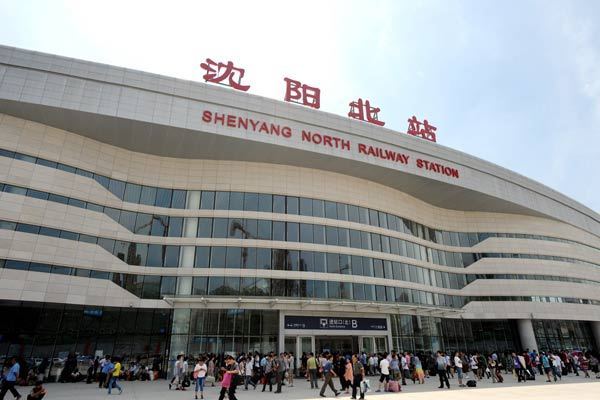Pinyin jumps aboard nation's trains
Updated: 2012-09-19 00:08
By ZHENG XIN (China Daily)
|
||||||||
 |
|
Shenyang North Railway Station, in Northeast China’s Liaoning province, will be changed to Shenyangbei Railway Station according to a new regulation of the Ministry of Railways. XINHUA |
If you go to Beijing South Railway Station over the National Day holiday, don't be surprised if the name has been changed into Beijingnan Railway Station.
The change is to comply with a regulation by the Ministry of Railways to standardize the English translation of names of rail stations.
The rule, in effect since Sept 1, requires the direction in the railway stations names to be spelled in pinyin as opposed to English.
"As an intrinsic part of the railway station's name, it is for the convenience of foreign friends and locals that the direction is spelled in pinyin," said Wang Bin, the publicity officer of the ministry.
But it may take some time for railway stations nationwide to change the names.
The signs at the railway stations and the names on the train tickets will also be changed, the ministry said.
Some experts applauded the changes, saying they implemented a nationwide standard while promoting Chinese characters and culture.
"To have one uniform translation standard is better than the co-existence of both 'south station' and 'nan station'," said Yang Quanhong, a linguist professor at the Sichuan International Studies University.
"One of the most important principles when it comes to translation is being faithful to the original," he said.
Yang said because pinyin is the official system to transcribe Chinese characters and is officially recognized by the United Nations, it helps promote Chinese culture.
Minzu University of China, for example, is a translation closer to its original, he said.
However, Yang also said it made more sense for foreigners if the English translation is also added along with pinyin.
Li Jinzhao, from Beijing Foreign Studies University, also said standardizing the railway station names with pinyin might be better for practical reasons.
"A taxi driver might not understand where Beijing South Railway Station is, but he definitely could drive you to the Beijingnan Railway Station," she said.
However, pinyin will not replace English spelling of subway stations in the capital, according to the Beijing Subway.
According to Sun Lijie, a publicity officer with the Beijing Subway, the name of a subway station, "Beijing South Railway Station" will not be changed.
Despite the railway's intention to provide more convenient services to foreign friends, those alien to the country's culture, especially characters and pinyin, don't really find the changes useful.
"Many people in the country speak simple English and it's not a big problem to find your way," said Abilio Santos, a 19-year-old student from the University of International Business and Economics, who came from Spain to China two weeks ago to study the Chinese language.
"For people like me, pinyin can better help foreign students with their Chinese language study."
He said translating all stations in the city with pinyin would not necessarily help foreigners.
"It's stupid if you refer to the Olympic Park as 'Aolinpikegongyuan', its pinyin translation," he said.
The public also questions if the changes are necessary.
"It doesn't fit an international city to translate its railway stations with local characters that hardly make sense to foreign tourists," said Gong Yu, a 26-year-old editor in the capital. "And I can't see why they decided to implement the changes at this time."
Tan Zongyang and Ji Jin contributed to this story.
Contact the writer at zhengxin@chinadaily.com.cn

 Relief reaches isolated village
Relief reaches isolated village
 Rainfall poses new threats to quake-hit region
Rainfall poses new threats to quake-hit region
 Funerals begin for Boston bombing victims
Funerals begin for Boston bombing victims
 Quake takeaway from China's Air Force
Quake takeaway from China's Air Force
 Obama celebrates young inventors at science fair
Obama celebrates young inventors at science fair
 Earth Day marked around the world
Earth Day marked around the world
 Volunteer team helping students find sense of normalcy
Volunteer team helping students find sense of normalcy
 Ethnic groups quick to join rescue efforts
Ethnic groups quick to join rescue efforts
Most Viewed
Editor's Picks

|

|

|

|

|

|
Today's Top News
Health new priority for quake zone
Xi meets US top military officer
Japan's boats driven out of Diaoyu
China mulls online shopping legislation
Bird flu death toll rises to 22
Putin appoints new ambassador to China
Japanese ships blocked from Diaoyu Islands
Inspired by Guan, more Chinese pick up golf
US Weekly

|

|







